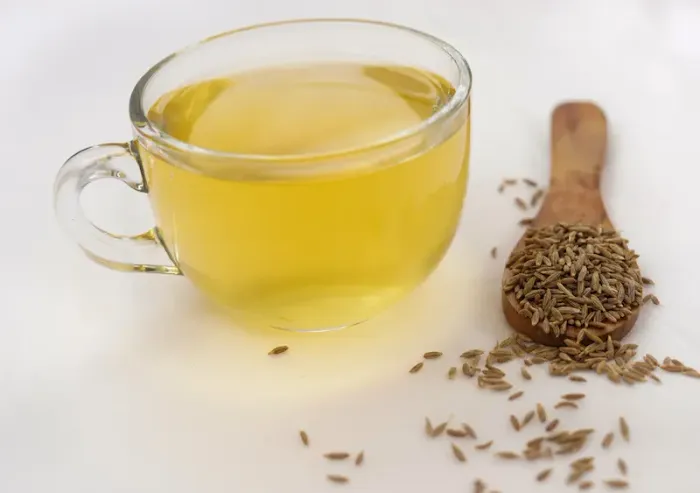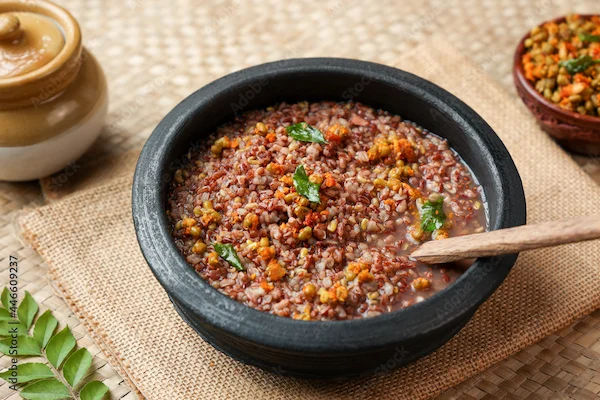Jeera Water Amazing Health Benefits and Possible Side Effects
Curious about jeera water benefits? Learn what cumin water can and can’t do, how to make this detox drink safely, plus side effects and FAQs.


Introduction
Jeera water (water infused with cumin seeds) is a simple, comforting drink enjoyed in many households for its soothing flavor and traditional digestive uses. You’ve probably seen it touted online as a detox drink, a metabolism booster, or even a cure-all. But what does science actually say? In this guide, we break down the real jeera water benefits, what’s still unproven, possible side effects, how to make it safely, and who should be careful.
What Is Jeera Water (Cumin Water)?
Jeera water is made by steeping or gently boiling whole cumin seeds (Cuminum cyminum) in water. People typically drink it warm, sometimes strained or with the seeds left in. It’s caffeine-free, very low in calories, and has an earthy, slightly bitter flavor that many find calming, especially after meals.
Is Jeera Water Really a Detox Drink?
Short answer: Your body already has a sophisticated detox system. Your liver, kidneys, lungs, skin, and digestive tract continuously process and remove waste products. Major medical sources emphasize that “detox” drinks and cleanses are not necessary for healthy people and can sometimes be misleading. Hydration does support kidney function, and a warm cup of jeera water is one pleasant way to stay hydrated. But jeera water does not “flush toxins” in a special way that plain water cannot.
Science Check: What Research Says About Jeera Water Benefits?
Cumin has been studied more than cumin-infused water specifically. Most potential benefits come from the spice, and the strength of the evidence varies. Here’s what’s reasonably supported, what’s promising-but-preliminary, and what’s not yet proven.
Hydration and gentle digestive support
• Hydration: Drinking enough fluids supports digestion, kidney function, circulation, and overall well-being. Choosing a warm, non-caffeinated beverage like jeera water can help you meet your fluid needs, especially if you prefer something with flavor over plain water.
• Digestive comfort: Traditionally, cumin is used as a carminative spice (to help relieve gas). Some people find warm, spiced water soothing after heavy or gassy meals. While clinical data on jeera water specifically are limited, cumin is commonly used in cooking to enhance digestion, and replacing carbonated or very sweet drinks with warm water may reduce bloating for some.
Consult a Top General Physician
Antioxidant compounds
• Cumin seeds contain antioxidant compounds (including certain phenolics and terpenes). Antioxidants help counter normal oxidative processes in the body. The exact level of antioxidants extracted into jeera water depends on how long and how hot you steep the seeds. Whole-food use of spices in cooking is a more established way to obtain these compounds.
Iron and micronutrients: know the limits
• Cumin is notably rich in iron when eaten as a spice. However, if you only drink the water and discard the seeds, you’ll get much less iron than if you actually eat the seeds or use ground cumin in cooking. If improving iron status is your goal, focus on iron-rich foods and discuss testing and supplementation with your clinician.
Weight management: context matters
• Some small studies suggest cumin (especially higher-dose supplements or regular culinary use) may modestly support weight and lipid management when combined with a balanced, calorie-conscious diet and exercise. That doesn’t mean jeera water alone causes fat loss. What can help is replacing sugary beverages with unsweetened options like cumin water, which reduces overall calorie intake.
Blood sugar and heart health markers: early signals, not definitive
• Studies of cumin in food or supplement form indicate possible benefits for blood sugar and cholesterol profiles. Evidence varies, and supplement doses are not the same as what you get from a light infusion. For blood sugar or cholesterol management, follow your clinician’s plan; consider cumin as a flavorful addition to meals rather than a substitute for treatment.
Bottom line on jeera water benefits
• What jeera water can do: support hydration; provide a pleasant, low-calorie alternative to sweet drinks; offer gentle digestive comfort for some people; and contribute a small amount of spice-derived compounds.
• What jeera water cannot do: replace medications or a balanced diet; rapidly “detox” your body; guarantee weight loss or cure health conditions.
How to Make Cumin Water Safely at Home?
There’s no single “right” recipe. This simple method keeps it food-safe and easy to drink:
Basic method
• Rinse 1 to 2 teaspoons of whole cumin seeds briefly under running water.
• Add 2 cups (about 480 mL) of clean drinking water.
• Bring to a gentle simmer for 5 to 10 minutes until the water is pale yellow and aromatic.
• Let it cool slightly; strain if you prefer. Sip warm or at room temperature.
Optional flavor twists
• A thin slice of fresh ginger or a squeeze of lemon added after simmering.
• A pinch of cinnamon or fennel seeds for a sweeter profile.
Food safety tips
• Use safe, potable water. If you’re unsure about water quality, boil it for at least 1 minute and cool before use (or use bottled water).
• Wash your hands and utensils before preparation.
• Make only what you’ll drink within 12 to 24 hours. Store leftovers covered in the refrigerator and reheat once if desired.
How Much and When Should You Drink It?
• Typical intake: 1 to 2 cups per day is reasonable for most healthy adults who enjoy it.
• Timing: Many people like a warm cup in the morning or after meals. Choose times that feel good to you—there is no evidence that a specific time is uniquely beneficial.
• Hydration goals: Aim to meet your overall daily fluid needs from water, unsweetened beverages, and high-water foods. Jeera water can be one of those beverages.
Who Might Benefit Most?
• People trying to cut back on sugary drinks: Cumin water is a flavorful, zero-added-sugar choice.
• Those who enjoy warm beverages after meals: It can be a soothing ritual that may help you slow down and eat mindfully.
• People who like spice-forward flavors: If you already cook with spices, jeera water fits naturally into your routine.
Possible Side Effects and Who Should Be Careful?
Most people can enjoy jeera water in culinary amounts without problems. Still, consider these points:
Allergies
Cumin belongs to the Apiaceae family (which includes celery, coriander/cilantro, and parsley). If you have known allergies to related spices or plants, use caution and consult a clinician.
Heartburn or reflux
Spices and warm beverages can trigger heartburn in some people with GERD. If jeera water worsens your symptoms, reduce the amount, drink it cooler, or avoid it.
Medications and medical conditions
Herbal products and concentrated spice preparations can interact with certain medicines. While jeera water is typically mild, discuss routine use with your healthcare provider if you take prescription medications, have chronic conditions (such as GERD, kidney disease, or bleeding disorders), or plan surgery.
Pregnancy and breastfeeding
Safety data for many herbs during pregnancy and lactation are limited. Culinary amounts of cumin in food are commonly used, but regularly drinking concentrated herbal preparations, including strong spiced infusions, should be discussed with your obstetric provider.
Contamination and hygiene
Always prepare jeera water with clean water and clean utensils. Discard if it looks or smells off.
Practical Tips to Get the Most from Jeera Water:
• Build a hydration habit: Keep a thermos of warm cumin water at your desk if it helps you drink more fluids.
• Pair with balanced eating: Combine it with fiber-rich meals (vegetables, legumes, whole grains) to support digestion naturally.
• Eat the spice, too: To capture more of cumin’s nutrients and flavor, use ground or whole cumin generously in cooking—soups, lentils, roasted vegetables, and rubs.
• Be consistent but moderate: Enjoy it regularly if you like, but remember: benefits come from overall dietary patterns and lifestyle, not one drink.
Myths vs. Facts About Jeera Water
• “It melts belly fat.” Myth. No drink targets fat from one body area. Weight changes reflect overall energy balance, sleep, stress, and movement.
• “It detoxes your liver.” Myth. Your liver detoxifies continuously. Staying hydrated helps, but no specific drink “cleanses” it.
• “It’s a cure for anemia.” Myth. Cumin contains iron, but you need to consume the spice itself—and usually much more iron—from foods or supplements under medical guidance to treat deficiency.
• “It’s unsafe.” Mostly myth. For most healthy adults, jeera water is safe in culinary amounts. Use common-sense precautions and ask your clinician if you have concerns.
Consult a Top General Physician
Consult a Top General Physician

Dr. Rajib Ghose
General Physician/ Internal Medicine Specialist
25 Years • MBBS
East Midnapore
VIVEKANANDA SEBA SADAN, East Midnapore

Dr. Moumita Roy
General Physician/ Internal Medicine Specialist
8 Years • MBBS , MD (Anesthesiology)
Kolkata
VDC Clinic, Kolkata

Dr. Swagato Podder
General Practitioner
5 Years • MBBS
Kolkata
GRD POLYCLINIC, Kolkata

Dr. Abhishek Ranjan
General Practitioner
4 Years • MBBS
Kolkata
VDC Clinic, Kolkata

Dr. Abhishek Gowda
General Physician/ Internal Medicine Specialist
3 Years • MBBS MD General Medicine
Bengaluru
PRESTIGE SHANTHINIKETAN - SOCIETY CLINIC, Bengaluru
Consult a Top General Physician

Dr. Rajib Ghose
General Physician/ Internal Medicine Specialist
25 Years • MBBS
East Midnapore
VIVEKANANDA SEBA SADAN, East Midnapore

Dr. Moumita Roy
General Physician/ Internal Medicine Specialist
8 Years • MBBS , MD (Anesthesiology)
Kolkata
VDC Clinic, Kolkata

Dr. Swagato Podder
General Practitioner
5 Years • MBBS
Kolkata
GRD POLYCLINIC, Kolkata

Dr. Abhishek Ranjan
General Practitioner
4 Years • MBBS
Kolkata
VDC Clinic, Kolkata

Dr. Abhishek Gowda
General Physician/ Internal Medicine Specialist
3 Years • MBBS MD General Medicine
Bengaluru
PRESTIGE SHANTHINIKETAN - SOCIETY CLINIC, Bengaluru
More articles from General Medical Consultation
Frequently Asked Questions
1) Does jeera water burn belly fat?
No. There’s no evidence any drink burns fat in one spot. Jeera water may help if it replaces higher-calorie beverages, supporting overall calorie reduction, but weight loss comes from sustained habits—balanced eating, activity, sleep, and stress management.
2) Is it OK to drink cumin water on an empty stomach?
For most healthy adults, yes. Some people like a warm cup first thing in the morning. If you notice heartburn, nausea, or discomfort, drink it with food or later in the day, or reduce the amount.
3) Can pregnant or breastfeeding people drink it?
Culinary use of cumin in food is common, but there’s limited research on regular use of herbal infusions in pregnancy and lactation. If you want to drink jeera water frequently, discuss it with your obstetric or pediatric care provider.
4) Will jeera water raise my iron levels?
Not by itself. While cumin is iron-rich as a spice, the infusion contains far less iron than eating the spice. If you’re concerned about iron deficiency, ask your clinician about testing and an evidence-based plan that may include diet changes and, if needed, supplements.
5) How is jeera water different from other herbal drinks like lemon water or green tea?
• Jeera water: caffeine-free, spice-based, earthy flavor.
• Lemon water: adds vitamin C and acidity; also caffeine-free.
• Green tea: contains caffeine and tea polyphenols.
All can be healthy options if you enjoy them and they fit your needs. None is a magical detox drink.




